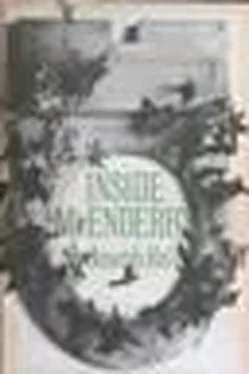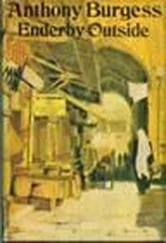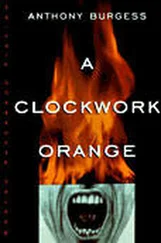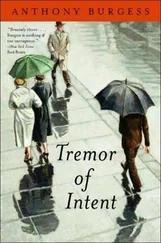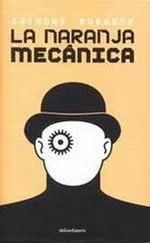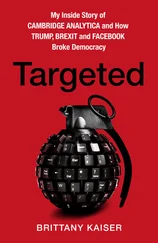"Mr Enderby?" The lady panted slightly and very prettily. "Oh, thank goodness I was in time."
"I knew," said Enderby, "that Sir George would realize it was all a joke. Do, please, convey my apologies to him."
"Sir George? Oh yes, I know who you mean. Apologize? I don't understand." She was perhaps thirty, with fashionable stallion-flared nostrils and a model-girl's swan-neck. She wore with grace a Cardin sugar-scoop hat of beige velours, and, from the same master, a loose-jacketed suit with only a hint of flare to the peplum. An ocelot coat swung open over this. Chic shone from her demurely. Such cleanness and fragrance (Miss Dior), thought Enderby with deep regret, such slender and sheer-hosed glamour. A face, he decided, devoid of all obvious sensuality-no lusciousness of the underlip, the cat-green eyes very cool and intelligent, a calm high forehead shaded by the sugar-scoop brim. Enderby tightened his tie-knot and smoothed his side-pockets, saying: "I'm sorry." And then, "I thought. That is to say." She said:
"Oh." They stood looking at each other under the glowing glass-slab signs of the hotel passage, their feet sunk in burgundy carpel. "Well. I would like, before anything else, to tell you that I genuinely admire your work." She spoke with the intonation of one expecting an incredulous snort. The voice was quiet, though the consonants had the sharpness of some speaker too close to a microphone, and there was the faintest tang of educated Scots. "I wrote to you care of your publishers, ages ago. I don't think the letter could ever have reached you. If it had reached you I'm sure you would have replied."
"Yes," said flustered Enderby. "Oh yes, I would. But perhaps that was forwarded by them to my old address because I'd forgotten to tell them about my new address and also, for that matter, the Post Office. Cheques," said blabbing Enderby, "are normally paid straight into my bank. I don't know why I'm telling you all this." She stood in a model pose, listening coolly with lips parted, handbag hanging from right forearm, gloved left hand's thumb and index-finger lightly ringing ungloved right hand's ring-finger. "I'm terribly sorry," said humble Enderby. "That may explain why I never got it."
She finished her quiet listening and suddenly became brisk. "Look," she said, "I had an invitation to that luncheon-party but I couldn't make it. Could we, do you think," she suggested, with a kind of movement on the fringe of non-movement which was a sort of apotheosis of a working-girl's jigging up and down in a winter-day bus-queue, infinitely feminine, "sit down somewhere for a few minutes, if you can spare the time, that is? Oh," she said, "I'm so stupid," the gloved hand striking the lips in mea culpa, "not telling you who I am. I'm Vesta Bainbridge. From Fem."
"From what?"
"Fem."
"What," asked Enderby, with great and suspicious care, "is that?" He had heard it as, though hardly believing it possible, something like Phlegm, and wondered what could be the purpose of an organization (if it was an organization) so named.
"Yes, of course, I see, of course you probably wouldn't know about that, would you? It's a magazine for women. And I," said Vesta Bainbridge, "am the Features Editress. Could we then, do you think? I suppose it's too early to have tea, isn't it, or is it?"
"If you would care for some tea," said gallant Enderby, "I should be only too happy, I should be only too delighted."
"Oh, no," said Vesta Bainbridge, "you have to have it with me, you see, because it goes on my expense account. And this is a business thing, you see, connected with Fem."
Enderby had once, as a poor soldier, been treated to a tea of poached egg on haddock and shortbread by a kind old lady in an Edinburgh restaurant. But by anyone so glamorous, so alluring as this, he had never thought, never dreamed. He was both shocked and awed. "Do you, by any chance, come from Edinburgh?" he asked. "Something in your voice -"
"Eskbank," said Vesta Bainbridge. "How remarkable! But, of course, you're a poet. Poets can always dig out things like that, can't they?"
"If," said Enderby, "you really like my poetry, which you said you did, I should really ask you to have tea with me, not you me with you. The least I could do," said generous Enderby, fingering a half-crown in Arry's trouser-pocket.
"Come," said Vesta Bainbridge, and she made the wraith of a gesture of taking Enderby by the arm. "I do admire your work, really," she insisted. She led him on sure high heels past the dainty boutiques that sold flowers and jewellery, the air-travel kiosk where there was busy telephoning about flights to New York and Bermuda, past the ugly and rich cocooned in an enchantment of wine-coloured snow underfoot, perfumed air all about, light drifting, dust-soft, from unseen sources in the delicate golds of fine white bordeaux. Here every breath, every footfall, thought thrifty Enderby, must cost at least a tanner. Vesta Bainbridge and he entered a vast room of huge scooped cubes of biscuit-coloured softness in which people lounged warmly cushioned. Laughter tinkled, teatrays tinkled. Enderby felt with horror his bowels prepare to comment on the scene. He looked up at a baroque ceiling with many fat-arsed cherubim in evidence. This did not help. They sank down, Vesta Bainbridge exhibiting the delicacy of exquisite shinlines, a fine moulding of ankle. A Roman waiter, lantern-jawed, took her order. Scots, she asked for a substantial spread: anchovy toast, egg sandwiches, pikelets, cakes, China tea with lemon. "And," said Enderby, "do you manage to eat dinner after a tea like that?"
"Oh, yes," said Vesta Bainbridge. "I can't put on weight, however hard I try. The lemon tea's because that's the way I like tea, not for slimming reasons. Obviously," she added.
"But," said Enderby, drawn to the obvious weary compliment, "you're surely perfect as you are." Suddenly he saw himself, boulevardier Enderby, witty with women, graceful in flattery, roguish eyes atwinkle, taking tea. At the same time wind fought, as a picked-up naughty kitten fights, to be free. Tea free. A free tea. "And," he said, "if I may ask, what precisely is this business with Phlegm?"
"Oh," she said, "isn't that funny? That's what Godfrey Wainwright calls it. He does covers, you know. Fem. Not, perhaps, a very good choice of name. But, you know, the market's saturated with magazines for women- Feminocrat, Goodwife, Lilith, Glamourpuss. The straightforward names with Woman in them were worked out long ago. It's so difficult for them to think of anything new, as you'll appreciate. But Fem isn't too bad, is it? It's short and sweet, and it sounds Frenchified and a bit naughty, wouldn't you agree?"
Enderby eyed her warily. Frenchified and a bit naughty, eh? "Yes," he said. "And where would I come in with something like that?" Not very good, she'd said, and not too bad-both in the same breath. Perhaps not a very sincere sort of woman. Before she could answer his question the tea arrived. The Roman waiter laid it down gently on the fretted claw-footed low table-silver dish-covers steaming, tiny cakes oozing cream. He rose, bowing with sneering jowls, retiring. Vesta Bainbridge poured. She said:
"I thought somehow you'd prefer your tea like this-sugarless, milkless, lemony. Your poems are a little, shall we say, astringent, if that's the right word." Enderby looked down sourly at the sour cup. He preferred stepmother's tea really, but she'd ordered without consulting him. "Very nice," he said. "Just right." Vesta Bainbridge began to eat with great appetite, showing fine small teeth as she bit into her anchovy toast. Enderby's heart warmed to this: he liked to see women eat, and this gusto mitigated, somehow, her lean perfection. But, he thought, she had no right, with such a figure, to have such an appetite. He felt a desire to invite her out to dinner, that same evening, to see how she would tuck into minestrone and pork chops. He feared her.
Читать дальше
